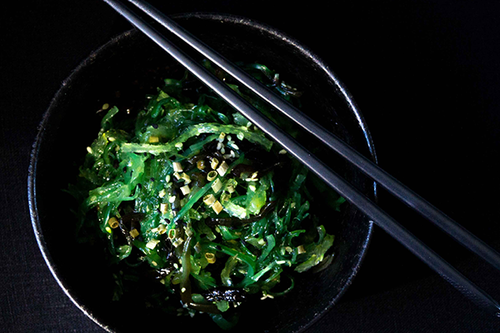
Exploring
the right foods
And embracing a healthy and balanced diet
A healthy, balanced diet is rich in nutrients and can enhance the health of both our brains and our bodies. Nutritionally balanced foods are easy to find and will be very familiar - they represent the five basic food groups of fruits, vegetables and legumes, grains, meat, poultry and fish, and dairy.
Here, we share foods rich in the nutrients that enhance brain health, and which benefit physical wellbeing too. Using these foods, we also have created recipes for easy, tasty meals that are good for our brains.
1. Oily fish
Rich in DHA, EPA, vitamins and minerals, omega-3 polyunsaturated fatty acids, oily fish provide most of the nutrients important for the brain. They support brain functioning and lower health risks, such as for mental health issues, heart disease, cancer and arthritis.
Types…
Salmon, sardines, anchovies, herring, and mackerel.
Nutrients…
DHA, EPA, vitamins A, B, D, E & K, choline, iron, iodine, and zinc.
2. Wholegrains
A good source of B vitamins, antioxidants and fibre, wholegrains support the gut, enable metabolism and reduce inflammation within the brain. They help us to stay alert and focused throughout the day, improving cognition and memory.
Types…
Oats, barley, wheat, quinoa, millet, rice, and wholewheat bread, pasta, and crackers.
Nutrients…
B vitamins (thiamin, riboflavin, niacin, folate), iron, magnesium, selenium, and fibre.
3. Nuts & seeds
Rich in ALA short-chain omega-3 fatty acids and the antioxidant, vitamin E, nuts and seeds are important in promoting healthy brain function. They help to prevent cognitive decline and support messages to be delivered throughout the body using neurotransmitters.
Types…
- Nuts…almonds and walnuts.
- Seeds…pumpkin, flax, and sunflower seeds.
Nutrients…
Vitamin E and magnesium.
4. Leafy green veg
A source of many and varied vitamins and minerals, dark leafy green vegetables are important in nervous system functioning. They can help to delay cognitive decline, enhance functioning and improve memory.
Types…
Spinach, kale, broccoli, lettuce, chard, and arugula.
Nutrients…
Fibre, folate, carotenoids, vitamins C and K, iron, and calcium.
5. Dark berries
A good source of flavonoids and anthocyanins, berries combat oxidative stress and brain damage. They improve memory, learning capacity and help to reduce mental health issues and decline of cognitive and motor function.
Types…
Blackberries, raspberries, blueberries and strawberries.
Nutrients…
Flavonoids, anthocyanins, fibre, manganese, and vitamins C and K.
6. Legumes
With the highest level of protein, carbohydrates, and fibre of any plant source, legumes help to stabilise the blood glucose supply to the brain. This provides a steady source of energy to the brain and helps with concentration.
Types…
All beans and pulses, such as lentils, chickpeas, kidney beans, soybeans, and peas.
Nutrients…
Folate, manganese, and iron.
7. Red meat
High in protein and iron, red meat helps to create energy, boost brain health, strengthen the immune system, and build bones and muscles. It can help to protect us from neurological disorders, cardiovascular disease, infertility and cancer.
Types…
Beef, lamb and pork.
Nutrients…
Iron, vitamin B12, and zinc.
8. Eggs
A good source of protein, eggs are crucial to mood and memory. They are important for memory and learning, and research has found that a key component of eggs - choline - is at a very low level in Alzheimer’s patients.
Types…
White or brown, from organic, free-range, cage-free, or battery-cage hens.
Nutrients…
Choline, and vitamins B, D and E.
9. Shellfish
High in lean protein and omega-3 fatty acids, shellfish are important for heart and brain health. They enhance brain development in children and healthy brain function in adults, speeding up thinking and delaying the signs of cognitive ageing.
Types…
Prawns, clams and mussels.
Nutrients…
Vitamin B12, zinc, and fatty acids.
10. Milk
A good source of calcium, protein, fat, and energy, milk is essential for proper brain function and for maintaining strong, healthy bones. It lowers risk of fractures and of bone diseases, such as osteoporosis.
Types…
Cow milk, goat milk, sheep milk, natural yoghurt and cheese.
Nutrients…
Calcium, protein, iodine, potassium, vitamins A, B (B12, riboflavin, niacin), D and phosphorus.
11. Tomatoes
Rich in lycopene, tomatoes have antioxidant properties. They help to protect the brain against oxidative stress and reduce free radical damage that is often displayed in neuro-degenerative conditions such as dementia.
Types…
Bush tomatoes and vine tomatoes.
Nutrients…
Lycopene.
12. Algae
An important source of marine-based omega-3 fatty acids for vegetarians and vegans, algae are high in DHA and EPA. Anti-inflammatory, they protect against neuro-developmental, neuro-degenerative and mental health conditions.
Types…
Seaweed, chlorella, and spirulina.
Nutrients…
DHA and EPA.












